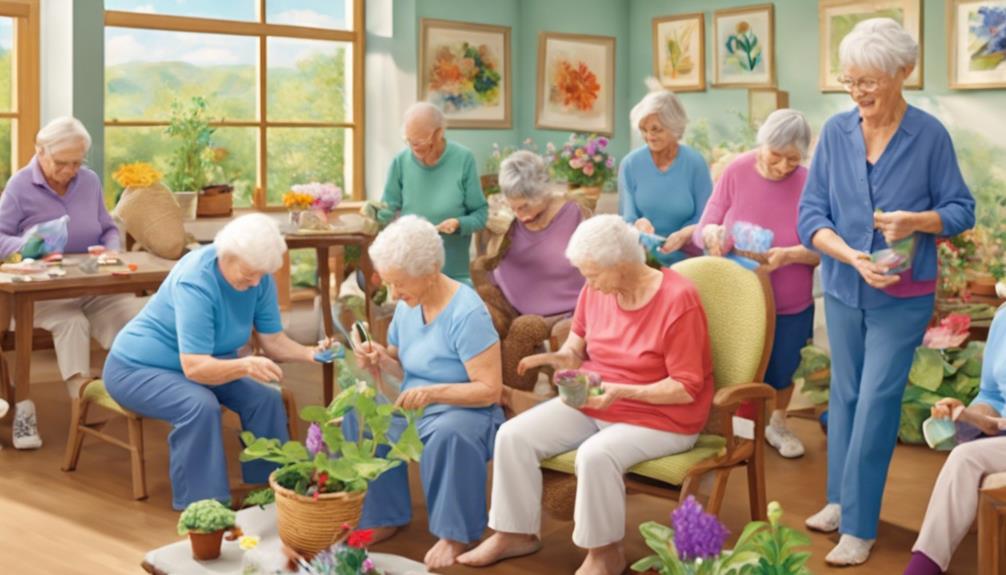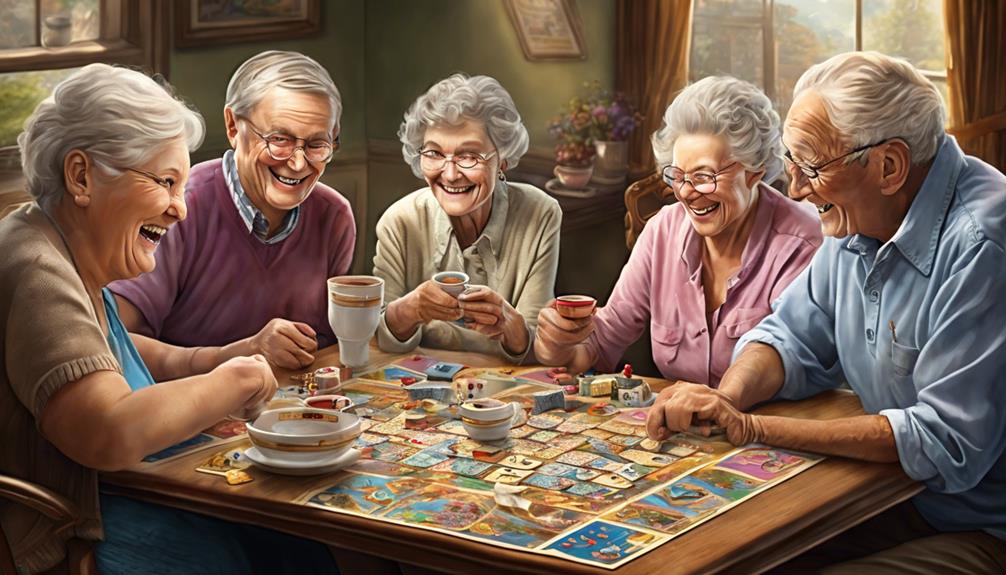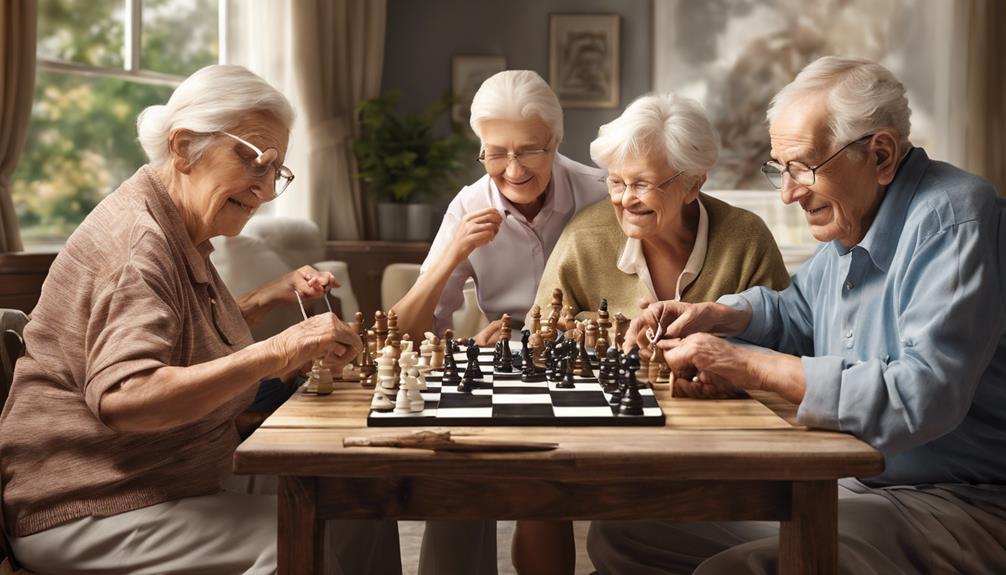Activities
Activities for Senior Citizens: Promoting Well-being Through Hobbies
Leverage the transformative power of hobbies to enhance the well-being of senior citizens and discover how these activities foster purpose and vitality.

When considering the well-being of older adults, it’s intriguing to see the significant impact that taking part in hobbies can have on improving their overall quality of life. Engaging in meaningful activities and maintaining an active lifestyle offer benefits that go beyond just filling their time; they can contribute to a more fulfilling and improved lifestyle for the elderly.
From boosting mental acuity to fostering social connections and emotional well-being, the realm of hobbies offers a vast landscape of possibilities for seniors to explore and enjoy. But how exactly do these hobbies translate into tangible benefits for their well-being? Let's delve into the transformative power of activities tailored to senior citizens and how they can promote a sense of purpose and vitality in their lives.
Key Takeaways
- Engaging in hobbies benefits cognitive function and memory in seniors.
- Hobbies promote social connections, reducing loneliness and enhancing well-being.
- Physical activities through hobbies improve fitness levels and mental well-being.
- Leisure activities for seniors boost happiness, purpose, and combat loneliness.
Benefits of Engaging in Hobbies
Engaging in hobbies not only brings joy and fulfillment but also plays a crucial role in enhancing the mental well-being of senior citizens. For older adults, participating in activities they enjoy can have a significant impact on their overall quality of life. Pursuing hobbies isn't just a way to pass the time; it actively contributes to maintaining cognitive function and mental sharpness. By staying engaged in activities that stimulate the mind, seniors can reduce the risk of developing depression and anxiety, promoting a positive mental state.
Moreover, hobbies provide a sense of purpose and accomplishment, which is especially important during the retirement years. These activities boost self-esteem and mood, leading to an improved outlook on life. Research has shown that regular engagement in hobbies can even lower the risk of cognitive decline and dementia in older adults. Therefore, encouraging seniors to explore and participate in hobbies they find engaging can have lasting benefits for their mental and emotional well-being.
Social Connections Through Activities

Participating in group activities not only enriches the lives of senior citizens but also cultivates vital social connections that contribute to their overall well-being. Social connections play a crucial role in the lives of older adults, impacting their emotional well-being and reducing feelings of loneliness.
Engaging in group activities provides opportunities for meaningful interactions, fostering a sense of community and belonging among seniors. These interactions can enhance cognitive function and memory retention, promoting mental sharpness and agility in the elderly population.
Moreover, regular social engagement through activities has shown to lower the risk of depression and anxiety, highlighting the importance of staying socially connected in later years. Activities that involve social connections, such as book clubs or group outings, can help seniors maintain a sense of purpose and fulfillment in their daily lives, contributing to an overall sense of well-being and happiness.
Physical Health Benefits of Hobbies
Exploring physical hobbies such as gardening, yoga, and walking offers significant benefits for senior citizens' physical health and overall well-being. Engaging in these activities provides avenues for relaxation, stress reduction, and improved fitness levels. Physical exercise is crucial for maintaining and enhancing seniors' physical abilities, promoting an active lifestyle that contributes to their well-being. By participating in hobbies like horticulture and meditation, seniors can't only improve their physical health but also promote relaxation and reduce stress levels.
Regular physical activity through hobbies like hiking and yoga not only enhances physical fitness but also supports mental well-being and self-reflection in seniors. These activities contribute to better physical health, mental well-being, and relaxation, creating a holistic approach to senior well-being. Encouraging seniors to engage in physical activities through hobbies can be a fulfilling way to improve their overall quality of life and promote a healthy lifestyle.
Cognitive Stimulation Through Leisure Pursuits

Delving into recreational activities that stimulate cognitive functions can significantly benefit seniors' mental acuity and overall well-being. Engaging in games, puzzles, and hobbies that challenge the mind isn't only enjoyable but also essential for maintaining cognitive health in seniors.
Here are three ways in which cognitive stimulation through leisure pursuits can positively impact seniors:
- Enhancing Cognitive Functions: Participating in activities like solving puzzles and playing games can help seniors with Alzheimer's disease or dementia maintain their cognitive abilities and memory.
- Boosting Mental Stimulation: Reading books and engaging in crafting activities are excellent ways to stimulate the mind, enhance problem-solving skills, and improve cognitive functions in seniors.
- Improving Cognitive Health: Learning new games, completing puzzles, and exploring hobbies like gardening can provide the mental stimulation needed to keep seniors' brains active and promote cognitive well-being.
Emotional Well-being Through Leisure Activities
Engaging in leisure activities not only enhances cognitive functions but also plays a crucial role in promoting emotional well-being among senior citizens. Participating in hobbies is a powerful way to reduce stress, promote relaxation, and boost overall happiness. By pursuing leisure activities, seniors can find a sense of purpose and fulfillment, which are essential for maintaining good physical and mental health. Hobbies provide an avenue for self-expression and creativity, leading to a more positive outlook on life.
Moreover, engaging in leisure activities helps seniors build social connections, reducing feelings of loneliness and isolation. Through shared interests and experiences, individuals can form meaningful relationships and combat the negative effects of social isolation. Studies have shown that seniors who regularly participate in hobbies have lower rates of depression and anxiety, highlighting the importance of leisure activities in promoting emotional well-being. So, let's encourage our beloved seniors to explore different leisure pursuits to enhance their emotional well-being and overall quality of life.
Frequently Asked Questions
What Are the Activities for Older Adults Health Promotion?
Engaging in physical activities like yoga, walking, and swimming promotes physical health and overall well-being in older adults. Participation in mental stimulation activities such as puzzles, games, and crafting helps maintain cognitive functions and mental acuity.
Social interactions through group hobbies, book clubs, and conversations are essential for emotional support and well-being in seniors. Outdoor activities provide fresh air, sunlight, and contribute to enhanced physical and mental health in older adults.
Consulting with a physician before starting new exercises ensures safety and maximizes health benefits for seniors.
How Do You Promote Wellness in Older Adults?
To promote wellness in older adults, we focus on holistic approaches.
We encourage social connections, offer diverse activities, and support cognitive functions.
By engaging in meaningful hobbies, participating in group activities, and staying physically active, we enhance mental health and overall well-being.
Our goal is to create a supportive environment that nurtures happiness and independence.
What Hobbies Are Suitable for Old People?
When considering hobbies for older individuals, it's crucial to focus on activities that cater to their physical, mental, and social well-being.
Engaging in creative pursuits, physical activities, intellectual hobbies, and social interactions can all contribute to a senior's overall wellness.
What Are Good Activities for Old People?
When considering good activities for seniors, we focus on promoting physical, mental, and emotional well-being.
Engaging in hobbies like gardening, painting, or card games can boost overall health.
Social activities such as book clubs and volunteering nurture emotional connections.
Pursuing hobbies like photography and dancing fuels creativity.
Mental stimulation through puzzles and learning new skills maintains cognitive functions.
Technology aids social interactions through online platforms.
It's essential to find activities that enhance seniors' holistic well-being.
Conclusion
In conclusion, engaging in hobbies as senior citizens can truly enrich our lives in more ways than one. From boosting our social connections and physical health to keeping our minds sharp and emotions balanced, hobbies play a crucial role in promoting our overall well-being.
So, let's keep on rockin' and rollin' with our favorite activities, because staying active and involved is the key to living our best lives in our golden years.
Albert brings a wealth of knowledge and expertise to our writing team. With a background in caregiving and a deep understanding of the challenges faced by caregivers, Albert’s writing resonates with authenticity and empathy. He is committed to delivering high-quality content that empowers and supports caregivers on their journey.
Activities
Aromatherapy and Dementia: Unlocking the Potential of Essential Oils in Cognitive Care
Hover over the fragrant world of essential oils as we delve into their mysterious link with cognitive function in dementia – a captivating journey awaits.

Stepping into the realm of cognitive therapy, the enticing scent of essential oils draws us closer to a potential breakthrough in dementia care.
The intricate dance between aromatherapy and cognitive function holds secrets waiting to be unveiled, offering a glimpse into a world where the power of scent could hold the key to enhancing memory and emotional well-being in those affected by dementia.
The subtle yet profound impact of essential oils on the mind hints at a path worth exploring further, promising a unique approach to supporting cognitive health in individuals facing memory challenges.
Key Takeaways
- Olfactory sense linked to limbic system aids cognitive care.
- Lavender and lemon balm oils offer cognitive benefits in dementia.
- Aromatherapy with essential oils shows promise in slowing cognitive decline.
- Safe use and proper dilution essential for effective aromatherapy in dementia care.
The Science of Aromatherapy in Dementia
As experienced caregivers, we've witnessed firsthand the profound impact of aromatherapy on cognitive functions in individuals with dementia. The olfactory sense plays a vital role in aromatherapy, as it's intricately linked to the limbic system, the part of the brain responsible for emotions, behavior, and long-term memory. In dementia care, where cognitive decline is a significant challenge, harnessing the power of aromatherapy with essential oils like lavender and lemon balm can be transformative. Research indicates that olfactory enrichment through these essential oils can positively influence cognitive skills, potentially slowing down cognitive impairment in conditions like Alzheimer's disease.
The direct connection between the olfactory sense and the brain makes aromatherapy a valuable tool in addressing cognitive decline. Studies have shown that essential oil interventions have a tangible impact on enhancing cognitive functioning in dementia patients. By stimulating the olfactory system, aromatherapy has the potential to improve memory, cognitive skills, and even sleep quality in individuals struggling with cognitive impairments. This scientific understanding underscores the significance of incorporating aromatherapy into dementia care practices.
Key Benefits of Essential Oils

The therapeutic benefits of essential oils for individuals with dementia encompass a range of key advantages, from promoting better sleep to enhancing cognitive performance. When considering the well-being of dementia patients, the use of essential oils like lavender and lemon balm can offer significant benefits:
- Improved Sleep: Lavender oil, known for its calming properties, can help in promoting better sleep quality for individuals experiencing restlessness or sleep disturbances due to dementia-related issues.
- Enhanced Cognitive Performance: Lemon essential oils have shown promise in boosting cognitive performance, potentially aiding in improving memory and cognitive functions in dementia patients.
- Olfactory Sense Stimulation: Utilizing essential oils not only provides therapeutic benefits but also stimulates the olfactory senses, which can have beneficial effects on cognitive decline and overall well-being.
Aromatherapy Applications in Cognitive Care
In our practice, we've found that the strategic application of various essential oils, such as rosemary, lemon, lavender, and orange, plays a crucial role in enhancing cognitive function for individuals with dementia. Aromatherapy is a powerful tool in cognitive care, with diffusers being commonly used to disperse these essential oils for maximum benefits.
Additionally, the topical application of oils on skin, temples, or pulse points offers longer-lasting effects, promoting improved cognitive function over time. When facing cognitive challenges, essential oils like peppermint and basil can be particularly helpful in boosting focus and concentration through aromatherapy practices.
Moreover, creating customized blends with oils such as lavender, chamomile, and frankincense can effectively reduce stress and anxiety in individuals with dementia, providing a holistic approach to cognitive care. By incorporating these tailored aromatherapy techniques into daily routines, we can support cognitive function and enhance the overall well-being of those we care for.
Essential Oils for Memory Enhancement

Transitioning from our exploration of aromatherapy applications in cognitive care, we now focus on the significant role essential oils play in memory enhancement. Essential oils have shown promising results in improving cognitive function, especially in older adults dealing with memory-related issues such as dementia.
When it comes to memory enhancement, different essential oil odorants offer unique benefits:
- Rosemary Essential Oil: Known for its ability to enhance memory, mental clarity, and alertness, rosemary essential oil can be a powerful tool in boosting cognitive function and improving memory recall.
- Lemon Essential Oil: With its energizing properties, lemon essential oil increases energy levels and uplifts mood, providing a cognitive boost that can aid in memory retention and cognitive performance.
- Peppermint Essential Oil: Boosting focus, concentration, and mental alertness, peppermint essential oil can help improve cognitive performance and enhance memory retention in individuals looking to sharpen their mental acuity.
Safety Guidelines for Aromatherapy
Prior to engaging in aromatherapy practices, it's essential to adhere to safety guidelines to ensure a positive and risk-free experience. Essential oils should always be diluted before use to prevent skin irritation or adverse reactions. Performing a patch test before applying essential oils is crucial to confirm no allergic reactions occur. It's important to keep essential oils out of reach of children and pets to prevent accidental ingestion, which can be harmful. For pregnant women, consulting with a healthcare provider before using essential oils is recommended, as some oils may not be safe during pregnancy.
When storing essential oils, it's best to use dark glass bottles and keep them away from direct sunlight. This helps preserve their potency and prevents degradation over time. By following these safety guidelines, you can enjoy the benefits of aromatherapy while ensuring the well-being of yourself and those around you.
Frequently Asked Questions
How Does Aromatherapy Help Dementia Patients?
Aromatherapy helps dementia patients by stimulating olfactory receptors tied to emotional regulation. Essential oils like lavender, bergamot, and lemon balm can calm patients and reduce aggression. This therapy enhances cognitive function and memory in those with dementia.
Certain oils alleviate anxiety and depression symptoms. Its popularity is growing as a complementary treatment for dementia, showing promise in cognitive care.
What Essential Oils Are Good for Cognitive Impairment?
When we consider essential oils for cognitive impairment, we find rosemary, peppermint, lavender, and lemon stand out.
Each oil offers unique benefits: rosemary boosts memory, peppermint aids concentration, lavender reduces stress, and lemon uplifts mood.
These qualities can greatly enhance cognitive function in those facing challenges.
The power of these essential oils lies in their ability to address cognitive impairments effectively, offering hope and support for individuals seeking improved mental clarity.
What Are 3 Things to Never Do With Your Loved One With Dementia?
When caring for a loved one with dementia, it's crucial to avoid disagreements, rushing them, and making sudden changes in routine. These actions can lead to frustration, stress, and confusion.
Instead, we aim to provide a calm and consistent environment, validate their emotions, and offer support. By focusing on patience, empathy, and stability, we can enhance their quality of life and strengthen our connection with them.
What Is the Number One Trigger for Dementia Behavior?
When it comes to dementia behavior, the number one trigger is often environmental factors. Loud noises, unfamiliar surroundings, changes in routine, or disruptions in familiar settings can all lead to challenging behaviors in individuals with dementia.
Understanding and minimizing these environmental triggers is crucial for managing the well-being of those affected. Creating a calm and familiar environment can help reduce agitation and confusion, improving the quality of life for individuals with dementia.
Conclusion
In conclusion, essential oils have shown great potential in improving cognitive function and emotional well-being for individuals with dementia. By incorporating aromatherapy into cognitive care strategies, we can unlock the power of scent to stimulate memory, enhance focus, and promote relaxation.
Remember, when it comes to caring for loved ones with dementia, sometimes the simplest solutions can have the biggest impact. So why not give aromatherapy a try and see if it's the missing piece of the puzzle?
Albert brings a wealth of knowledge and expertise to our writing team. With a background in caregiving and a deep understanding of the challenges faced by caregivers, Albert’s writing resonates with authenticity and empathy. He is committed to delivering high-quality content that empowers and supports caregivers on their journey.
Activities
Family Tree Research – What’s In Your Family Genealogy?
Intrigued by the secrets hidden in your family tree? Discover the fascinating world of genealogy and uncover your unique heritage.

We understand that delving into your family tree can seem daunting, especially with the vast amount of information out there. However, searching through your ancestry can reveal fascinating discoveries that connect you to your roots in unexpected ways.
From uncovering long-lost relatives to understanding the cultural heritage that shaped your family, exploring your genealogy can provide a sense of identity and belonging that transcends generations. So, why not take the first step and embark on this journey of self-discovery through your family tree research?
Key Takeaways
- Gather vital info systematically from family for comprehensive family tree.
- Utilize essential records like death certificates, census for detailed genealogy.
- Explore census, city directories for family insights, movements, connections.
- Connect with genealogical societies for networking, resources, preservation efforts.
Starting Your Family Tree Research
To embark on your journey of family genealogy research, we must first delve into the foundational steps of starting your family tree research. Begin by gathering vital information about yourself, your parents, and grandparents. Record and organize details about your ancestors systematically to lay a strong groundwork for your family tree. Key elements such as names, dates, places, and relationships are crucial in identifying individuals in historical records. Understanding the significance of names, event dates, locations, and family connections is essential for constructing an accurate family tree.
Home resources like family documents, bibles, certificates, diaries, and photographs are invaluable for gathering essential data. These personal items can provide valuable insights and details that may not be available in public records. Utilizing these resources can uncover hidden gems of information about your ancestors that can enrich your family history research. Remember, by starting with what you know and gradually working backward, you can piece together a comprehensive picture of your family's lineage.
Essential Records for Genealogy

Embarking on our exploration of family genealogy research, we now turn our focus to the critical foundation provided by essential records for tracing and documenting our lineage. These essential records serve as the backbone of our family tree, offering invaluable insights into our ancestors' lives. Here are three key types of records crucial for genealogical research:
- Death Certificates: Death certificates provide vital information such as the date and cause of death, which can lead to discovering burial locations, next of kin, and sometimes even birthplaces.
- Federal Census Records: Census records are a treasure trove of details, offering a snapshot of our ancestors' lives every ten years, including names, ages, occupations, relationships, and addresses.
- Land Records: Land records not only reveal property ownership but also provide clues about migration patterns, economic status, and community connections that can enrich our understanding of our family history.
Delving into archives for these essential records can uncover fascinating details and help piece together the puzzle of our lineage.
Exploring Census and City Directories
Exploring Census and City Directories reveals a wealth of historical data crucial for understanding our ancestors' lives and societal connections. Census records, archived in the National Archives, provide a detailed snapshot of our family members' lives every decade in the United States. These records offer insights into family structures, demographics, occupations, and residential locations, enabling genealogists to track changes over time.
City directories complement census records by showcasing residents' addresses, businesses, and occupations, painting a vivid picture of urban life and community dynamics. By utilizing both census records and city directories in genealogical research, we can piece together a comprehensive understanding of our ancestors' lives within the societal contexts of their time. These resources not only help us trace family members' movements and connections but also shed light on the broader historical landscape in which they lived, enriching our appreciation for the past.
Utilizing Libraries and Archives

Libraries and archives provide a treasure trove of compiled family histories and local records essential for in-depth genealogical research. When delving into your family history, consider the following key points:
- Access to Courthouse Records: Libraries and archives offer a wealth of courthouse records such as wills, probate documents, land records, and deeds. These original documents can unveil vital information about your ancestors' lives and possessions.
- City Directories: Make use of city directories available in libraries to discover details about your ancestors' residences, occupations, and even business endeavors. These directories can provide insights into the daily lives of your relatives.
- State Archives Resources: State archives often house a plethora of valuable records beyond vital statistics. By exploring these archives, you can uncover family stories, track movements through state census records, and access a variety of original documents crucial for expanding your family tree research.
Connecting With Genealogical Societies
Engaging with genealogical societies enhances research depth and fosters collaboration with seasoned experts in the field. By joining these societies, individuals gain access to valuable networking opportunities, educational materials, and exclusive resources for delving into their family history. Members can attend workshops, conferences, and events tailored to genealogy research, expanding their knowledge and honing their research skills. Genealogical societies also play a crucial role in preservation efforts, supporting digitization projects and promoting genealogical research for the benefit of future generations.
| Benefits of Connecting with Genealogical Societies | |
|---|---|
| Networking Opportunities | Gain connections with fellow researchers and experts |
| Educational Materials | Access exclusive resources and databases for research |
| Preservation Efforts | Support digitization projects and research promotion |
| Future Generations | Contribute to the preservation of family history for future genealogists |
Frequently Asked Questions
How Do I Research My Family Genealogy?
When researching our family genealogy, we start by gathering vital information about immediate family members. We record names, dates, and places for previous generations.
Online platforms like Ancestry.com and FamilySearch.org are valuable resources. Preserving and scanning family photos can provide genealogical insights.
It's important to keep detailed records of sources and cross-check information for accuracy. This thorough approach helps us uncover our family history effectively.
What Is Included in Genealogy?
When exploring genealogy, one discovers a rich tapestry of family history woven through generations. Births, marriages, deaths, and occupations of our ancestors are meticulously documented.
Unraveling family connections and migrations reveals a captivating narrative of our past. Cultural heritage, traditions, and customs passed down offer insight into our roots.
Through genealogy, we gain a profound understanding of our heritage, connecting us to the stories of those who came before us.
How Can I Find My Genealogy for Free?
To find your genealogy for free, we recommend utilizing online platforms like FamilySearch.org and Ancestry.com. These sites offer valuable resources and databases. Additionally, USGenWeb.org and FindAGrave.com provide free options for research. Stay cautious of document accuracy on such sites.
Take advantage of free access during holidays and explore various platforms regardless of religious affiliation. Access to research databases is widely available online.
How to Pass on Research What to Include in Your Genealogy Will?
When passing on research in our genealogy will, we include vital documents, family narratives, and contact info for key resources. This ensures future generations can continue our work.
Organizing materials in a clear and accessible manner is crucial. Preservation of our research findings aids in maintaining our family's history.
Conclusion
In conclusion, delving into our family genealogy is like unraveling a complex tapestry of interconnected stories and relationships. By piecing together vital records, exploring historical documents, and connecting with genealogical societies, we gain a deeper understanding of our lineage and heritage.
Just as a skilled historian uncovers hidden truths in ancient manuscripts, we too can uncover the rich history of our ancestors through diligent research and exploration.
Albert brings a wealth of knowledge and expertise to our writing team. With a background in caregiving and a deep understanding of the challenges faced by caregivers, Albert’s writing resonates with authenticity and empathy. He is committed to delivering high-quality content that empowers and supports caregivers on their journey.
Activities
Taking a Trip Down Memory Lane: Crafting a DVD for Your Loved One With Dementia
Embark on a nostalgic journey like no other by crafting a DVD for your loved one with dementia – a heartfelt gesture that bridges past and present, igniting precious memories and emotions.

Making a DVD for a loved one affected by dementia could serve as the most significant way to encapsulate an entire lifetime’s worth of memories into a single, tangible object.
As we dive into the intricacies of selecting the perfect photos and songs, you'll discover how this personalized journey down memory lane can bridge the gap between past and present, igniting moments of recognition and joy.
Stay tuned to unravel the secrets of creating a heartfelt DVD that not only preserves cherished moments but also fosters a deeper connection with your loved one, sparking conversations and evoking emotions that transcend time.
Key Takeaways
- Nostalgia therapy benefits Alzheimer's and dementia patients.
- Create a cozy, distraction-free space for viewing.
- Select content that reflects cherished memories.
- Engage in activities triggering memories for comfort and connection.
The Power of Nostalgia
When creating a DVD for a loved one with dementia, tapping into the power of nostalgia can evoke cherished memories and emotions, providing comfort and connection. Memories from the past hold a special place in our hearts, and for individuals with dementia, these memories can be a source of joy and familiarity. Engaging in activities that trigger these memories can help bridge the gap between the past and the present, allowing your loved one to reminisce about happier times.
Dementia can often make it challenging for individuals to recall recent events, but memories from years gone by tend to remain intact. By incorporating old pictures, music, and storytelling into the DVD, you can create a treasure trove of nostalgia that brings comfort and happiness to your loved one. Nostalgia therapy has shown remarkable benefits for Alzheimer's and dementia patients, helping them feel more at ease and connected to their identity. So, as you craft this DVD, remember the power of nostalgia in unlocking precious memories and emotions for your loved one.
Step-by-Step Guide

As we embark on the journey of creating a memory DVD for a loved one with dementia, our first crucial step is gathering photographs and videos to capture cherished moments and create a meaningful experience. This process can be emotional, so remember to take breaks and care for yourself throughout.
Here are some tips to guide you through this journey:
- Handle Memories with Care: Treat each photograph and video clip as a precious memory, honoring the stories they hold.
- Embrace Emotions: Allow yourself to feel the nostalgia and love that come with revisiting these moments.
- Create a Safe Space: Set up a cozy, quiet area where you can immerse yourself in the memories without distractions.
- Celebrate Every Moment: Recognize the importance of this activity in connecting with your loved one and creating lasting memories.
Each step you take in this process is a meaningful activity, not just for your loved one but also for you. Embrace the journey down memory lane with compassion and dedication.
Choosing the Right Content
To curate a memory DVD that resonates deeply with your loved one with dementia, carefully selecting photos and videos that hold significant sentimental value is essential. When choosing the right content, focus on incorporating images and videos that reflect past events and cherished memories shared with loved ones. These visuals can serve as powerful triggers, taking your loved one on a heartfelt journey back in time. Including moments from family gatherings, special occasions, and vacations can evoke a sense of nostalgia and connection to their past.
Additionally, integrating music that's meaningful to your loved one can enhance the emotional impact of the DVD. Songs that resonate with their past experiences and emotions can help create a comforting and familiar atmosphere. Organize the content in a coherent manner, either chronologically or thematically, to weave a compelling narrative that guides them through the journey of 'Taking a Trip' down memory lane. By carefully selecting content that's engaging, positive, and tailored to their preferences, you can ensure a truly meaningful viewing experience for your loved one.
Personalizing the DVD

Let's now focus on personalizing the DVD to create a truly meaningful and engaging experience for your loved one living with dementia. When crafting the DVD for your loved one's journey down memory lane, consider these emotional touches:
- Selecting photos and videos that hold special memories can bring a sense of familiarity and comfort.
- Incorporating their favorite music won't only enhance the viewing experience but also help evoke cherished memories.
- Adding recorded messages or voiceovers can establish a personal connection and convey love and warmth.
- Organizing the content chronologically or by themes can help create a cohesive narrative that resonates with your loved one.
Editing and Finalizing
When finalizing the DVD for your loved one with dementia, ensure that the transitions, music, and effects are thoughtfully added to enhance their viewing experience. These elements can help create a seamless and engaging journey through the memories captured on the DVD. It's crucial to keep in mind that individuals living with Alzheimer's may have varying levels of cognitive abilities, so simplicity and clarity in editing are key.
As family members, we've the opportunity to create a personalized and meaningful viewing experience for our loved ones. By carefully arranging photos and videos in a coherent manner, we can help them follow along and connect with the content on a deeper level. Adding personalized touches like captions or recorded messages can also make the DVD more engaging and emotionally resonant.
Before finalizing the DVD, it's essential to double-check for any errors or inconsistencies. Ensuring that the menu is easy to navigate will make the viewing experience more enjoyable for your loved one. By putting in this extra effort during the editing and finalizing process, we can create a special keepsake that brings joy and comfort to our family member with dementia.
Frequently Asked Questions
How Can I Ensure That the DVD Will Be Easy for My Loved One With Dementia to Navigate and Use?
To ensure the DVD is easy for our loved one with dementia to use, let's keep it simple.
We should organize it into clear sections with large, easy-to-read labels. Using familiar pictures or symbols can also help them navigate.
Including familiar music or voices can provide comfort and aid in recognition.
Lastly, we can test the DVD with our loved one to make sure it's user-friendly and enjoyable for them to use.
Are There Any Copyright Issues I Need to Be Aware of When Selecting Content for the Dvd?
Absolutely, it's crucial to consider copyright issues when selecting content for the DVD. We must be mindful of using only materials that we've the rights to, to avoid any legal complications.
It's essential to prioritize the well-being of our loved one and ensure that the process of creating the DVD is done ethically and respectfully. Let's make sure we gather content that brings joy and comfort without infringing on any copyrights.
What Are Some Tips for Creating a Calming and Comforting Viewing Experience for My Loved One With Dementia?
Creating a calming and comforting viewing experience for our loved one with dementia involves selecting familiar, soothing content. Keep lighting soft, minimize background noise, and offer gentle reassurances throughout.
Incorporate favorite music or nature scenes to evoke positive emotions. Ensure the environment is cozy and free of distractions. Watching together can also provide a sense of security and connection.
These small adjustments can make a big difference in their overall well-being and enjoyment.
How Can I Involve Other Family Members in the Process of Creating the Dvd?
We can involve other family members in creating the DVD by assigning different tasks based on their strengths and interests. Some can gather photos, others can write heartfelt messages, and a few can help with editing. By sharing the workload, we ensure everyone contributes in a meaningful way.
Encouraging open communication and collaboration allows us to create a personalized and touching DVD that truly reflects our loved one's life and journey.
Are There Any Special Considerations I Need to Keep in Mind When Presenting the DVD to My Loved One With Dementia for the First Time?
When presenting the DVD to our loved one with dementia for the first time, we should create a calm and familiar environment.
It's important to be patient, allowing them time to process the information. Using gentle reminders about who's in the video and the memories shared can help orient them.
Keep the viewing session short to prevent overwhelming them. Remember, the goal is to bring joy and connection through the shared memories.
Conclusion
In conclusion, crafting a DVD for a loved one with dementia is a meaningful way to share memories and create moments of connection. By taking a trip down memory lane together, we can evoke emotions, spark recognition, and strengthen bonds that transcend time.
So why not take the time to preserve precious memories and create a lasting keepsake that will bring comfort and joy for years to come?
Albert brings a wealth of knowledge and expertise to our writing team. With a background in caregiving and a deep understanding of the challenges faced by caregivers, Albert’s writing resonates with authenticity and empathy. He is committed to delivering high-quality content that empowers and supports caregivers on their journey.
-

 Dementia Care2 weeks ago
Dementia Care2 weeks agoHow Gabapentin Affects Dementia: A Comprehensive Guide
-

 Dementia Care2 months ago
Dementia Care2 months agoUnderstanding the Stages of Vascular Dementia: A Visual Chart Guide
-

 Dementia Care2 weeks ago
Dementia Care2 weeks ago5 Things You Need to Know About Jack Nicholson’s Dementia
-

 Medication Management1 month ago
Medication Management1 month agoGabapentin Side Effects: Memory Loss Concerns?
-

 Dementia Care2 months ago
Dementia Care2 months agoUnderstanding Narcissism and Dementia: A How-To Guide
-

 Palliative Care for Parkinson's2 weeks ago
Palliative Care for Parkinson's2 weeks agoPalliative Care for Parkinson’s: A New Hope for Patients”
-

 Palliative Care for Parkinson's2 weeks ago
Palliative Care for Parkinson's2 weeks agoUnlocking the Secrets of Palliative Care for Parkinson’s Disease
-

 Caregiver Support2 months ago
Caregiver Support2 months agoNavigating Caregiving: Understanding the Industry

















